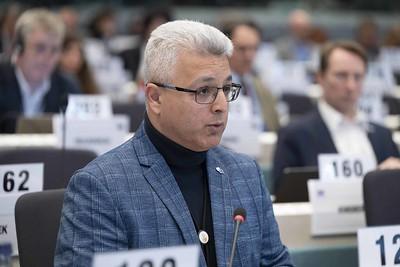European Economic
and Social Committee
Strengthening cooperation between the EU and Kazakhstani civil society
On the occasion of the fifth anniversary of the ratification of the Enhanced Partnership and Cooperation Agreement (EPCA) between Kazakhstan and the EU, the European Economic and Social Committee (EESC) adopted at its March plenary session an action plan for enhancing cooperation between civil society organisations in the European Union and Kazakhstan.
Partnership with the EU remains a cornerstone of Kazakhstan’s foreign policy. The Enhanced Partnership and Cooperation Agreement (EPCA), signed between Kazakhstan and the EU, has fostered deeper collaboration in key sectors such as trade, investment energy, agriculture and connectivity.
The numbers speak for themselves, as the country already supplies 71% of the EU’s imported phosphorus and 36% of its titanium, positioning itself as a linchpin in Europe’s industrial policy. Kazakhstan also possesses 33 of the 34 elements identified in the European Commission’s Critical Raw Materials Act, with 19 currently in production and another 14 confirmed for future extraction.
However, the EESC firmly believes that the implementation of the EPCA and the Global Gateway in Kazakhstan and Central Asia cannot be carried out without the involvement of civil society organisations.
As Dumitru Fornea, EESC member and rapporteur for the opinion, stressed: ‘Against the backdrop of intensifying great-power competition, the recalibration of global supply chains and the EU’s strategic push for economic resilience, the Kazakhstan-EU partnership on critical raw materials (CRMs) is becoming an increasingly pivotal element of Eurasian geopolitics’.
Mr Fornea added that it is essential to involve civil society in promoting the memorandum of understanding between the EU and Kazakhstan on a strategic partnership in the field of raw materials.
The opinion highlights that the relations between organised civil society in the EU and in Kazakhstan can develop in a structured way on the basis of an action plan with several priorities and in line with the objectives of the New EU Strategy for Central Asia. To this end, the Action Plan’s priorities should be:
- ensuring constant independent monitoring, evaluation and implementation of: workers’ conditions and trade union activities, respect for human rights and the rule of law, and freedom of the press;
- establishing structures for cooperation with Central Asian civil society, based on the model of existing civil society platforms with other areas of the world;
- supporting the development of civil society in Kazakhstan by increasing the educational opportunities for young Kazakhs through the Erasmus programme;
- providing an exchange programme for civil servants in the country’s administration and for staff in its judicial system, with the involvement of the European Institute of Public Administration in Maastricht and the European Centre for Judges and Lawyers in Luxembourg, in order to consolidate Kazakhstani civil society.
The opinion also makes reference to the Republic of Uzbekistan, since it and the Republic of Kazakhstan together are the most developed countries in the region. Both demonstrate the financial and administrative capacity necessary to ensure an institutional framework for relations between civil society organisations in Central Asia and the EU.
‘The establishment of national civil society platforms in these states would represent an important step forward towards the establishment of an EU-Central Asia Civil Society Platform, which would allow ongoing, structured dialogue to take place between civil society representatives from EU Member States and the states of the Central Asian region’, said the rapporteur, Mr Fornea.
Work organisation
Downloads
-
Strengthening cooperation between the EU and Kazakhstani civil society
